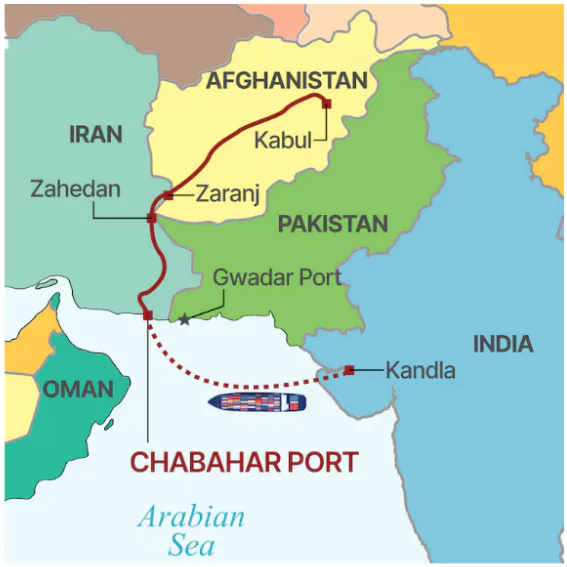As Iran and Israel threaten to plunge the Middle East into a dangerous regional war, India must stand by its Arab partners that are being squeezed by the conflict between the two countries.
Importance of Arab World
- Demographic and Economic Scale: With a population nearing 500 million across 23 states, the Arab world represents a vast market that far exceeds the populations of Israel and Iran.
- Strategic Location and Energy Security: The Gulf states are among India’s largest suppliers of crude oil, vital for sustaining its rapidly growing economy. The strategic proximity of these nations enhances India’s energy security.
- Cultural and Historical Ties: India has historic or civilisational ties and deep religious connections as it is the location for Hajj and Umrah.
- Religious Connections: The shared religious connections, particularly through Islam, facilitate a deeper understanding and respect for cultural values.
- The promotion of moderate Islam by the Arabian Peninsula can have a positive impact on the socio-political landscape of the Indian subcontinent, potentially contributing to stability and peace in the region.
- Growing Trade and Investment: Trade ties between India and the Arab world have seen significant growth, with India being one of the largest trading partners for many Arab countries.
- Indian Diaspora: This community not only contributes to the economies of the host countries but also serves as a bridge for cultural exchange and diplomacy, enhancing people-to-people connections.
Enroll now for UPSC Online Course
India’s Relations with Iran
- Historical Ties: India’s ties with Iran are as ancient and deep as its connections with Arabia.
- Geopolitical Importance: Geographically, Iran is even closer to India as compared to the Arabian Peninsula. Its borders with Afghanistan and Pakistan.
- Iran has the potential to act as a bridge or a gateway for India to central Asian regions, bypassing Pakistan’s political barriers through the Chabahar Port.

- Iran a Hydrocarbon Superpower: Iran, with its vast oil and natural gas reserves, is a hydrocarbon superpower.
Challenges in Indo-Iran Relations
- Sanctions by West: India’s potential for cooperation with Iran is hindered by Tehran’s ongoing conflict with the West and the heavy sanctions it faces. This makes it difficult to trade with Iran.
- Iran’s Foreign Policy: Iran’s foreign policy is confrontational in nature. For instance, Ali Khamenei, Supreme Leader of Iran has made comments over the Kashmir issue and has criticised India over its muslim minorities.
- Iran’s Religious Ideology: Iran’s ambition to reshape the Middle East according to its ideology presents an existential challenge in the eyes of the Gulf regimes.
- The Arabian peninsula promotes moderate Islam which is in contrast to Iran’s version of Islam which is revolutionary Islam.
- Iran’s Proxies: Iran has been using its proxies like Hamas, Houthis rebels and Hezbollah to bring instability in the region.
- Duality of India’s Behaviour: Although India has refrained from commenting on Iran’s support for such elements, this contrasts with its stance on Pakistan’s aid to groups like Lashkar-e-Taiba. India has often criticised Pakistan on various platforms but has remained silent over Iran.
India’s Relations with Israel
- Strengthening Ties: Unlike previous UPA governments, the NDA government has embraced and strengthened this relationship.
- Security and Technological Dominan: Israel has become an important partner for India, particularly in security and technology.
- Losing the Goodwill of the West: Israel has lost considerable goodwill globally, including in the West, due to its aggressive policies in Gaza and the West Bank.
- Israel Response to Hamas Attack: Israel lost 1500 of its people which was unfortunate. But after that Israel has taken a disproportionate response which resulted in the killing of 40,00 civilians in Gaza.
Check Out UPSC CSE Books From PW Store
Dilemma Faced by Arab States
- Due to all this, Arab states are facing a dilemma. They are facing two challenges.
- Iran’s Growing Influence: After Israel’s attack, Iran is positioning itself as the leader of the Muslim world. It claims to be the only state that has raised its voice on behalf of Palestine. Through this and its proxy groups, Iran is trying to expand its influence in the region.
- Israel’s Aggressive Behaviour: Every time Israel takes an aggressive stance, Arab states face increased pressure to criticise Israel and support the Palestinian cause, given their shared Muslim identity.
- Example: Earlier Saudi Arabia was trying to normalise its relations with Israel. But after Israel’s attack on Gaza these efforts were halted as it faced backlash and pressure to not support Israel.
- Normalising Relations With Iran: Gulf Arabs have also sought to find common ground with Iran. Recently China acted as a mediator to resume diplomatic relations between Iran and Saudi Arabia.
- Reasons for not Maintaining Relations with Iran: Iran’s aid to proxy groups has prevented Arab countries from maintaining stable relations with Iran.
- Example: The Houthi rebels in Yemen, neighbouring Saudi Arabia, have received support from Iran. This aid has strained the relationship between Saudi Arabia and Iran.
Way Forward
- India wishes for a peaceful, economically integrated Middle East that advocates for religious moderation.
- India also wants a Middle East that acts as a bridge between India and Central Asia
- India must support the Arab states. India should also help to prevent a devastating war between Iran and Israel, just like how it is playing an active role in the case of Russia-Ukraine war.
Enroll now for UPSC Online Classes
Conclusion
India should have a balanced approach. It should maintain relations with Iran and Israel but have more focus on relations with the Arab countries as these countries are more important to India.
![]() 10 Oct 2024
10 Oct 2024


